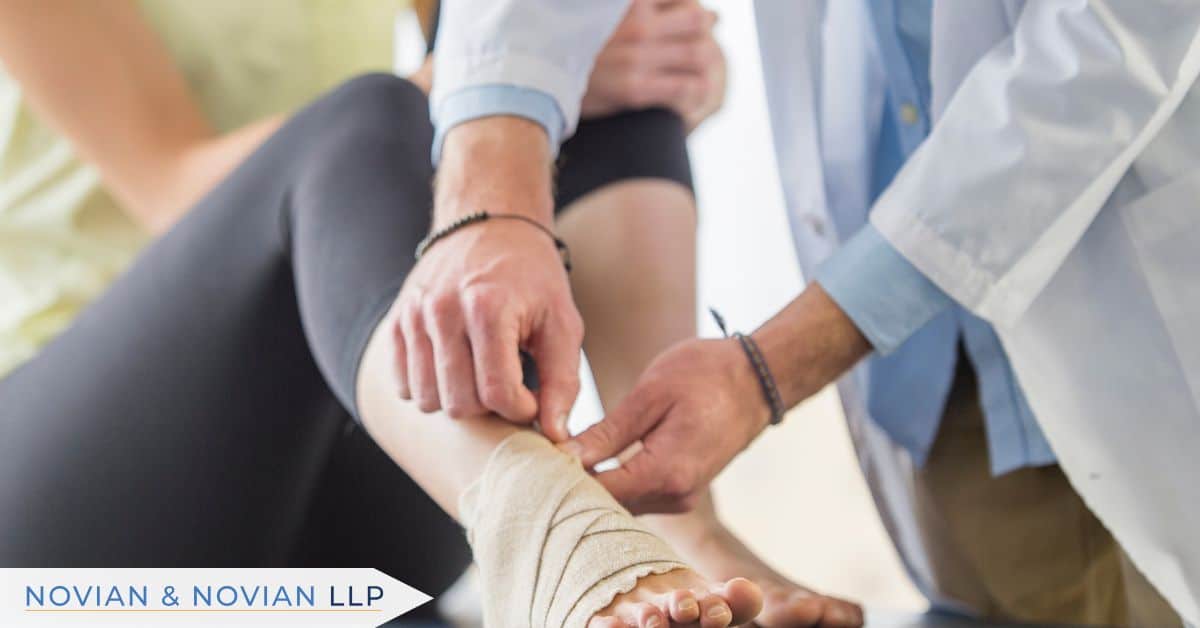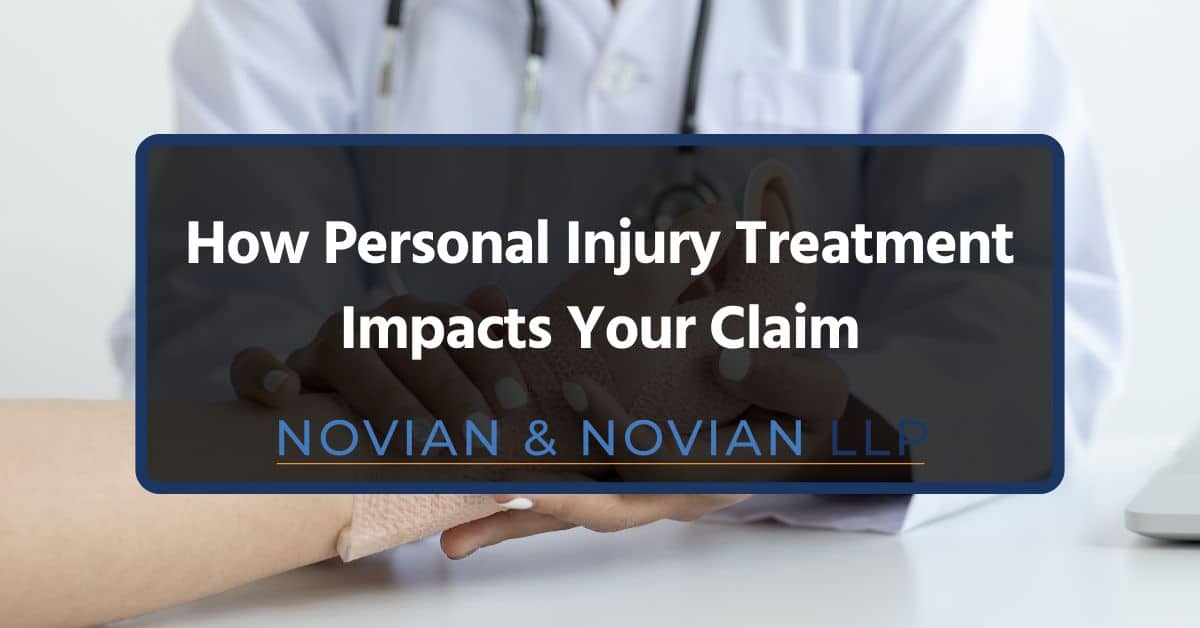When you suffer harm due to someone else’s negligence, the law defines it as a personal injury. Personal injury treatment varies depending on the severity and type of injury. However, it may include emergency medical care, surgery, physical therapy, chiropractic care, pain management, and ongoing rehabilitation.
At Novian & Novian, we have over 35 years of experience in helping accident victims get the compensation they deserve. If you’ve suffered a personal injury, our experienced catastrophic injury lawyers will guide you through every step of your claim. Contact us today to protect your rights.
This post will cover what qualifies as a personal injury and examples of common cases. It will further explain the various types of personal injury treatments.
Table Of Contents
What Types of Injuries Require Personal Injury Treatment?

Soft tissue injuries such as sprains, strains, and bruises are common after accidents. They often require consistent treatment like physical therapy sessions to restore mobility and reduce pain.
Similarly, broken bones and fractures demand immediate medical attention. It sometimes involves surgery, casts, or long-term rehabilitation to ensure proper healing. Head injuries and concussions can also have serious effects on physical health and may require evaluation by medical experts, as symptoms are not always visible right away.
Furthermore, burn injuries, whether caused by a fire, chemicals, or electrical accidents, often require ongoing treatment from healthcare providers to prevent infection and reduce scarring. Whiplash and spinal injuries can also lead to chronic neck pain, back problems, or even partial disability if not treated promptly.
In addition, psychological injuries, including PTSD and anxiety from trauma, are just as significant as physical injuries. They may require therapy or counseling to support the injured person’s well-being and recovery process. No matter the type of injury, seeking immediate medical care and following the treatment plan recommended by your doctor is one of the most important things you can do to protect both your health and your personal injury claim.
Why Treatment Is Important to Your Personal Injury Claim
Medical treatment plays an important role in the outcome of a personal injury case because it provides documented proof of the injuries caused by the accident. Detailed medical records from your medical providers help establish a clear link between the accident and the harm you suffered.
It further shows insurance companies, insurance adjusters, and the responsible party that your claim is legitimate. Timely treatment demonstrates the seriousness of your injuries, while regular visits and consistent treatment help prove the ongoing impact on your physical health, lost wages, and quality of life.
Medical bills, treatment reports, and records of physical therapy sessions are essential evidence in a personal injury lawsuit, as they help determine the extent of damages and the amount of financial compensation you may be entitled to. Insurance companies and courts rely heavily on medical evidence to decide on a fair settlement.
Delays or gaps in medical care can have a negative impact on your case, giving the other driver’s insurance coverage or defense attorney an opportunity to argue that your injuries were not severe or were unrelated to the accident. Proper treatment not only aids your recovery but also strengthens your legal rights in seeking compensation for pain, suffering, and other damages. Working closely with a personal injury attorney ensures that your medical treatment affects your case positively and maximizes your chances of securing a fair settlement.
Common Personal Injury Treatment Options
Personal injury treatment varies depending on the type and severity of the injuries caused by someone else’s negligence. But the goal is always to restore the injured person’s health, prevent complications, and protect their legal rights in a personal injury case.
Some common personal injury treatment options include:
Immediate First Aid and Emergency Care
The first step in addressing physical injuries after an accident is often immediate first aid and emergency care. Applying ice packs to reduce swelling, cleaning and dressing wounds, and immobilizing injured limbs can help minimize damage before professional medical providers take over.
In cases of serious injuries, such as fractures, head trauma, or uncontrolled bleeding, calling emergency services or going directly to the ER is the most important thing an injured party can do. This early medical care not only aids in recovery but also creates medical records that insurance companies, insurance adjusters, and the responsible party will review when determining the extent of damages and a fair settlement in a personal injury claim.
Medication and Pain Management
Medical treatment often includes medication to manage pain and inflammation. Over-the-counter pain relievers like ibuprofen and acetaminophen are common for mild injuries. On the other hand, more severe cases may require prescription pain medications, anti-inflammatory drugs, or muscle relaxants.
These treatments help the injured person maintain mobility, adhere to their treatment plan, and improve their overall well-being during the recovery process. Documenting all prescribed medications and related medical expenses is essential evidence in a personal injury lawsuit and can impact the amount of financial compensation awarded.
Physical Therapy and Rehabilitation
For many injury cases, physical therapy sessions play a crucial role in the recovery process. Stretching and strengthening exercises, manual therapy, massage, heat and cold therapy, and techniques like electrical stimulation or ultrasound therapy help restore physical health and mobility.
Consistent treatment overseen by medical experts can shorten recovery time and prevent long-term damage. Physical therapy also generates medical bills and progress reports that can be used to demonstrate the extent of the injuries and the suffering damages in a personal injury settlement.
Surgical Treatment
In some personal injury cases, surgery is unavoidable. Skilled medical providers may perform surgical procedures for fractures, torn ligaments, and severe injuries resulting from car accidents or falls.
The recovery process after surgery often involves weeks or even months of ongoing treatment, follow-up appointments, and physical therapy to regain strength and mobility. Surgical intervention also increases medical expenses, which can significantly affect the overall value of a personal injury claim and the amount of compensation an injured party may recover.
Chiropractic Care and Spinal Adjustments
Chiropractic treatment can be an effective option for injuries involving the back, neck, or whiplash, especially after car accidents. Realigning the spine and joints can help relieve pain, improve mobility, and support the injured person’s overall recovery process.
While chiropractic care offers benefits, it is important to follow recommendations from a doctor and maintain consistent treatment. This is important, as insurance companies and medical experts may evaluate whether it was an essential part of the treatment plan when deciding on a fair settlement.
Psychological and Emotional Support
Physical injuries are often accompanied by emotional trauma, making psychological treatment an important part of personal injury care. Counseling for trauma and anxiety, cognitive-behavioral therapy (CBT) for PTSD, and support groups can help the injured person cope with the mental and emotional challenges caused by the accident.
These services not only improve well-being but also create medical records and expenses that may be included in a personal injury lawsuit. Addressing emotional injuries is essential for a complete recovery and can strengthen the injured party’s claim for suffering damages, lost wages, and other compensation.
How Medical Treatment Affects the Value of Personal Injury Claims
Medical treatment plays a role in determining the value of a personal injury claim. Typically, comprehensive treatment records from medical providers and healthcare experts significantly increase the credibility of the case, as they provide clear evidence that the physical injuries were caused by the accident.
Early and consistent treatment shows insurance companies and insurance adjusters that the injured person is taking recovery seriously, which can lead to higher settlement amounts in a personal injury lawsuit. The type and extent of treatment reflect the severity of the injuries caused and their impact on the injured party’s life.
Documented treatments are also essential for proving medical expenses that require reimbursement. Ongoing treatment can justify claims for long-term or permanent damages, ensuring that future medical care costs are factored into a fair settlement.
Proper treatment demonstrates to the responsible party’s insurance coverage that you are actively working to recover, which supports your personal injury case. On the other hand, a lack of treatment or inconsistent medical care can have a negative impact on the claim, giving the other driver’s insurer room to argue that your injuries were not serious.
How Do Attorneys Help Maximize Injury Settlements?
A skilled personal injury attorney can be the most important factor in maximizing the value of your claim. Attorneys gather and organize all medical records, medical bills, and treatment documentation to ensure nothing is overlooked. They work closely with medical experts to accurately assess the injury’s severity, the extent of physical health damage, and the costs of ongoing treatment. By negotiating directly with insurance companies, personal injury lawyers aim to secure fair compensation that covers not only current medical expenses but also lost wages, pain and suffering, and future rehabilitation needs.
Attorneys also identify all possible damages in a personal injury case, ensuring that you never accept only a fraction of what you’re owed. They handle complex legal paperwork and strict deadlines to avoid claim delays or denials, while also advocating for coverage of future medical treatment, such as long-term therapy or follow-up surgeries.
Using their in-depth knowledge of personal injury law, they build a strong case against the responsible party, represent you in court if necessary, and help you avoid costly mistakes that could reduce your settlement amount. With an experienced personal injury lawyer guiding the recovery process, you increase your chances of obtaining a fair settlement that truly reflects the extent of your injuries and the financial compensation you deserve.
What Should You Do After a Personal Injury?
After being injured due to someone else’s negligence, it is essential to take immediate and strategic steps to protect both your health and your personal injury claim. Acting quickly and keeping thorough documentation can make a significant difference in the outcome of your personal injury case and the financial compensation you may receive.
Here’s what you should do:
- Report the injury: You should report the injury to the responsible party, employer, or relevant authorities as soon as possible. This creates an official record for your personal injury case.
- Seek medical attention promptly: To protect your health, seek medical attention immediately. It will help document your physical injuries and strengthen your personal injury claim.
- Keep detailed records: It is necessary to keep all medical treatment, physical therapy sessions, medical bills, and related expenses for use as evidence in your personal injury lawsuit.
- Follow your doctor’s advice and treatment plan: Following your doctor’s advice consistently will aid recovery and show insurance companies you are taking the injury and recovery process seriously.
Want to Maximize Your Personal Injury Settlement?
Proper medical treatment is one of the most important factors in determining the outcome of a personal injury case. From the moment an injured person seeks medical attention, every doctor’s recommendation, treatment plan, and medical record becomes valuable evidence that can increase the credibility and value of a personal injury claim. Timely and consistent treatment supports your recovery and strengthens your position when negotiating with insurance companies or pursuing a personal injury lawsuit in court.
At Novian & Novian, we have some of the best personal injury attorneys in California who can provide the knowledge, resources, and dedication needed to guide you through filing a personal injury case. Our team of skilled legal professionals is committed to helping injured parties recover the maximum financial compensation they deserve. Schedule a free consultation with us today!
FAQs
Getting proper treatment after an accident protects your health and strengthens your personal injury claim. Below are answers to some of the most common questions injured parties have when pursuing a personal injury case:
How Much Compensation Can You Get for Personal Injury?
The amount varies depending on the severity of your injuries, medical expenses, lost wages, and pain and suffering, as well as the strength of your evidence. An experienced personal injury attorney can help you pursue the maximum settlement possible.
Why Is Consistent Treatment Important to a Personal Injury Case?
Consistent treatment shows insurance companies and courts that your injuries are serious and that you are committed to recovery. Gaps in care can reduce the value of your personal injury settlement.
How Soon Should I Seek Treatment After a Personal Injury?
You should seek medical attention immediately to protect your health and create timely documentation for your claim. Delaying treatment can harm both your recovery and your case.
Does Insurance Cover Personal Injury Treatment?
Coverage depends on the type of insurance and the circumstances of the accident. Your personal injury lawyer can help review your insurance coverage and identify other compensation sources.
How Long Does Personal Injury Treatment Usually Take?
The recovery process can range from a few weeks to several months, depending on injury severity and the treatment plan. Serious injuries may require ongoing treatment or long-term rehabilitation.




